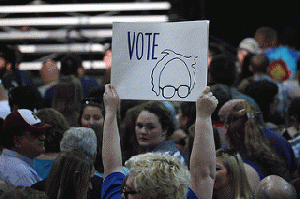My guest today is Steffie Woolhandler, M.D. Dr. Woolhandler co-founded Physicians for a National Health Program, which does research and advocacy for single-payer health care, but does not endorse candidates.
Joan Brunwasser: Welcome back to OpEdNews, Steffie. Sen. Sanders' Medicare for All plan has come under a lot of fire, most recently, from the Urban Institute. You fired back in your recent piece, "The Urban Institute's Attack On Single Payer: Ridiculous Assumptions Yield Ridiculous Estimates." It seems like this is a battle of numbers with each side bandying around its own set. What can you tell us concerned citizens that will not make our eyes glaze over? Can you walk us through this gently?
Steffie Woolhandler: Economic projections are based on assumptions, and in the Urban Institute's case, the assumptions are completely ridiculous. So it's no surprise that their spreadsheet spit out an outlandishly high number.
First they assume that insurance overhead in a U.S. single payer system would be 6%, although Canadian provinces run their universal insurance programs for just 1.8%. That assumption alone ups the Urban Institute estimate by $1.7 trillion.
Then they assume that the single payer would save nothing, zero, on the administrative work (and costs) at hospitals and doctors offices, In fact, these savings are even larger than the ones a single payer generates by trimming insurance administration. For instance, U.S. hospitals devote more than 25% of their budgets to billing and administration costs. Nations with single payer systems such as Canada and Scotland, can pay hospitals lump sum budgets (the way we pay for a fire department), so their hospitals have administrative costs of only 12%. U.S. doctors report spending 20 per cent of their time on paperwork, much of which would disappear in a simple, single payer system. Ignoring administrative savings at hospitals, doctors' offices, and other medical facilities ups the Urban Institute estimate by another $4.1 trillion.
The Urban Institute researchers assume that a U.S. single payer could never get the same low drug prices that national health systems negotiate in other countries, although a US single payer would have tremendous size and negotiating clout. This assumption alone up the Urban Institute's cost estimate by $1.1 trillion.
Finally, the Urban Institute projects a huge surge in patient's use of doctor visits and hospitals Such a surge was not seen when Medicare was implemented in the U.S. in the mid-sixties, nor was it seen when Canada implemented their single payer program. Modest increases in utilization are to be expected, but the time and money freed up by administrative simplification, and by lower drug prices, can easily pay for these modest increases.
JB: Everything you say sounds pretty reasonable to me. But, it also reflects the agenda of Physicians for a National Health Program, the organization you co-founded. What's a more accurate estimate for the cost of Sen. Sanders's program and do you feel his vision is pie in the sky because of the political climate of polarization and the entrenchment of Big Pharma, health care insurers, and anyone else who's eager to maintain the status quo.
SW: The most accurate estimates of the costs of a single payer system say that in its first year, it would cost the same amount that we are now spending. However, over time, single payer would do a better job of controlling costs, so that it would save money in the long run. It would not be possible to pass single payer with the current Congress, but that can be said about any health reform, including those advocated by Clinton. Big Pharma and big insurance will oppose single payer, but we do still live in a democracy. A popular movement for change, along with the right political leadership, can achieve Medicare-for-All.
JB: The corporate media seem bent on distorting the costs of this program, which is disappointing but not surprising. Has your recent piece gotten any press attention? And if so, how was it received?
SW: Our piece appeared in the Huffington Post, and a slightly modified version appeared on CNBC (online). Our previous piece on single payer costs (which was a critique of Ken Thorpe's estimates) got excellent pickup on the Huffington Post, the Philadelphia Inquirer and particularly on social media.
JB: Glad to hear that. Anything you'd like to add before we wrap this up?
SW: For more information on single payer health care, please take a look at the PNHP website, www.pnhp.org
JB: Thanks for talking with me again, Steffie, and setting the record straight.
(Note: You can view every article as one long page if you sign up as an Advocate Member, or higher).







